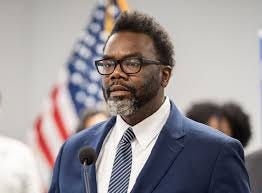Announcement of bid for second term is a huge political risk
That news allows the forces to gather their resources, including money, much earlier
Mayor Brandon Johnson has reiterated he is not a fan of conventional wisdom or traditional government and political actions.
He demonstrated that clearly on September 7 when he said he would run for a second term. He was talking with Sean Connolly, chairman of told the Economic Club of Chicago.
Traditionally and historically, incumbents, regardless of which office they’re holding wait until they are deep into their term before declaring a re-election bid. The mayor’s move carries so much risk because it gives opponents and would-be opponents ample opportunity to derail the chances of him being elected.
Johnson hasn’t logged in six months into his first term. The jury is still out on whether he has achieved anything noteworthy yet. And he has been slow to fill departmental heads and agency directors’ positions.
Certain alderpersons operating as a cabal could decide to thwart any ordinances or programs the mayor proposes. They can do so without being as bombastic and openly like hostile like the Vrdolak 29 were against the late Mayor Harold Washington.
No doubt Johnson’s announcement will cause many on the Chicago City Council to look at the upcoming budget in a new light-as feathering his re-election bed as opposed to doing what is best for Chicagoans. It is the council that has the final say on the budget. The mayor does have veto power. That could turn into a political volleyball as he vetos a piece of legislation; council has the authority to vote to overturn any vetoes.
As he navigates this first term, the mayor is likely to find himself from time-to-time reassuring himself he is taking a particular action because it is the right way to move, not as something to enhance his re-election chances.
It is a mighty narrow line he will have to walk. Even when he is doing the right thing for Chicago some will call him out as making a re-election move.
Young folk will not be his salvation
Even when hordes of teens and young adults roamed through the Miracle Mile and South Loop areas destroying property, looting stores, and injuring some bystanders, the mayor was reticent about condemning them. He was firm in his position it was decent kids doing bad things; but they aren’t bad kids. Obviously, that is a position honed from those four or five years as a CPS teacher. In his latest interview, the mayor outlined that youth will be the chief focus of his administration.
Tie that into the news he will seek re-election and there is a strong hint he believes a wave of young voters will keep him in office.
In the talk referenced above with the Economic Club’s chairman, Johnson gave all the right answers when asked how the business community could help. The mayor responded that the business community could provide jobs for young folks.
Unfortunately, for all parties, Johnson didn’t specify the types of jobs. The reality is far too many youngsters are unequipped with the skills to hold down many jobs. Among many in that cohort, there also is the expectation that their starting pay should exceed minimum wage, and despite lack of marketable skills, their new job need not be entry-level. The mayor had the opportunity to tell Connolly that a massive employment training program, funded by local corporations would be an ideal start to employing more young people, especially young Black people
The mayor is sending a clarion message that he cares for and support youth. If he expects that position and messasges to translate into votes in 2027, he is bound to be sorely disappointed.
With few exceptions, young people, not just young Chicagoans, don’t vote in anything near their percentage in the population. They did turn out for the Barack Obama first run in 2008. Those high numbers, more than 60 percent, have not been matched since.
If Johnson’s reelection run focuses on the young, he risks alienating the largest and most reliable voting bloc - senior citizens. With the migrant issues’ drain on the upcoming budget and possibly the subsequent one, coupled with the mayor’s unrealized plan to raise $800 million for his signature social programs; the mayor is likely to be forced into raising property taxes to keep the city afloat. Although he has pledged against a tax increase, it may be his only choice down the road. We all know that seniors, many of whom are homeowners, find a tax increase incentive enough to vote against an incumbent.






